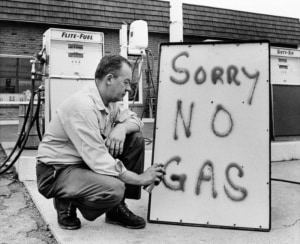The Politics of Oil and Gas
The purpose of government and politics is the same today as when the Golden Age of Greece developed their philosophies: to secure and protect what the people need. Without putting too fine a point on it for modern societies, the basics are comprised of food, energy, healthcare, technology, and data.
Oil and gas are major energy components today and will remain essential for decades to come. Yes, the world is moving towards more environmentally friendly or renewable energy sources, but oil and gas will help bridge to the future from today, and technology will continue making their carbon footprint smaller. Notice the switch from coal to oil and gas along with the domestic industry’s efforts to minimize environmental impact.
The politics of oil and gas is easy to trace. It started soon after our nation fell in love with the automobile, a love that fueled our thirst for gasoline. (We were the first nation to drill for oil –
Titusville, PA 1859 and Spindletop gusher near Beaumont, TX 1901). Free market practices then were much more competitive than now, eventually causing the government to rein in the excesses:
Standard Oil Co. of New Jersey v. United States, 221 U.S. 1, was a case in which the Supreme Court of the United States found Standard Oil Co. of New Jersey guilty of monopolizing the petroleum industry through a series of abusive and anti-competitive actions.
Ever since then, the government and major American oil companies have engaged in the typical tug-of-war that a democratic country’s market-driven mixed economy should expect. HOWEVER, WORLD POLITICS, NOT DOMESTIC POLITICS DOMINATES THE MOST IMPORTANT PARAMETER OF OIL: ITS PRICE! LET’S TRACE THE TRAJECTORY OF OIL’S INTERNATIONAL POLITICS.
Do you know who the “Seven Sisters” were? They were the major international oil companies who controlled until World War II 85 percent of crude oil production: Gulf Oil, Texaco, Royal Dutch Shell, Standard Oil of New Jersey, Standard Oil of California, Socony Mobil, and British Petroleum. Notice the verb “were”, not “are.” What happened?
The emergence of political power exercised by a growing number of nations after World War II. The demand for oil skyrocketed, and those nations fortunate enough to be sitting on oil rightfully wanted their fair share of the wealth for their people. They formed in the 60’s the OPEC consortium to leverage the power contained in their enormous reserves.
Of course, it took decades for national oil companies to take their place on the international stage, but today here are the players:
Privately-owned Super major oil companies:
- British Petroleum (British)
- Chevron and Exxon (American)
- Eni (Italian)
- Royal Dutch Shell (Dutch)
- Total SA (French)
National oil companies:
- Aramco (Saudi Arabia)
- China National Oil Company and Sinopec (China)
- Gazprom and Rosnoft (Russia)
- Iraq National Oil Company (INOC Iraq)
- National Iranian Oil Company (NIOC Iran)
- PDVSA (Venezuela Oil Company)
- Petrobras (Brazil)
- Pemex (Mexico)

Leon Mill spray-paints a sign outside his Phillips 66 station in Perkasie, Pa., in 1973
America awoke in the early 70’s to OPEC’s power when that organization declared U.S. oil embargoes that caused long lines at gas stations and pump prices to quadruple.
IT TOOK A LONG TIME FOR THE GOVERNMENT TO BELIEVE WHAT DOMESTIC OIL COMPANIES WERE SAYING: OIL PRICES WERE CONTROLLED BY OPEC FOR POLITICAL REASONS.
Though OPEC’s power is less today, much the same can still be said. OIL PRICES ARE CONTROLLED BY INTERNATIONAL POLITICS. AMERICA’S PRIVATE OIL COMPANIES ARE PRICE-TAKERS, NOT PRICE-MAKERS.
In today’s often skeptical and distrustful domestic political climate, criticism instead of credit is too often thrown at important industries, the O&G industry a prime example. But there are the other industries besides “Big Oil” that today also fall in the crosshairs:
- “Big Guns” (Military-Industrial Complex)
- “Big Drugs” (Pharmaceutical/Healthcare Industry)
- “Big Dollars” (Banking Industry)
- “Big Data” (Software/Platform Industry)
However, those in the know agree that our democratic, market-driven economy does better than any other country or system for obtaining the best outcomes for our people. There is no country better than America. ANY OIL COMPANY PROBLEMS ANY OTHER COUNTRY HAS IS CAUSED BY THAT COUNTRY’S DYSFUNCTIONAL POLITICS.
Consider all the above a preamble for what follows: a summary of an attention-getting recent book: Blowout by Rachel Madow, subtitled “Corrupted Democracy, Rogue State Russia, and the richest, most destructive industry on Earth.” Let’s objectively take a look at what it’s saying.
- Of course, it begins at the beginning, talking about how the government corralled Rockefeller’s Standard Oil of New Jersey’s monopoly. It does acknowledge that the modern world has to have energy, and that oil and gas are indispensable, but it gives an incomplete description of the hard work required to discover and produce “black gold.”
- It gives an undeservedly alarmist’s view of fracking and horizontal drilling for shale oil, an oil that has created thousands of jobs and made America into an energy exporter. And when the public became concerned about a link between fracking and myriad but minor earthquakes (earthquake swarms), concerned citizens and the government stepped in – an excellent example of Democracy in America.
- It focuses on Russian “kleptocracy” – Putin and his buddies stealing the country’s oil riches from its citizens. Indeed true, but oil and gas companies aren’t the perpetrators, they too are victims. Place the blame where it’s deserved: Russia’s dysfunctional government and politics.
- It spotlights powerful promoters of the O&G industry, such as Aubrey McClendon (Chesapeake Energy) and Rex Tillerson (former Exxon CEO and Secretary of State). It conflates them with large banks that want a share of the wealth for raising the capital to expand oil production. But that’s what promoters and banks have been doing for years in all industries. And in America, corporate ethics is higher than ever, thanks to the Internet and social networking. Private citizens can be part of the action and make their voices heard.
- It spotlights the inherent risks, visually etched in 2010 by BP’s Gulf Oil Spill. Yes, it was gut-wrenching to view, but the book doesn’t describe the technologies developed by the industry to contain the spill or break up the oil. Natural oil spills have occurred for millennia, and some types of bacteria break up spills by consuming it. The ecosystem is robust. And the book never compares O&G risks to risks in other industries. If you want to be alarmed by risk, look at risk in the pharmaceutical industry.
- It focuses a great deal on Russia, and well it should. Russian Oligarchy/Kleptocracy is using its oil reserves in what will ultimately be a failed effort to reclaim Russia’s previous place on the world stage. The book conflates questionable oil company practices with Russian and other countries’ dysfunctional politics, never considering the other side of the argument. COMPANIES IN ALL INDUSTRIES DO WHAT THE MUST (STAYING WITHIN ALWAYS BLURRED ETHICAL RAILS) TO MAKE MONEY. THEIR JOB IS NOT TO DICTATE A COUNTRY’S ETHICS. IF YOU WANT A GREAT EXAMPLE, LOOK AT HOW THE NBA IS HANDLING CHINA’S HONGKONG SNAFU.
- It gives short shrift to the overarching issue facing oil and gas: environmental damage and climate change. It barely mentions them. This book is focusing on how the O&G industry force multiplies political corruption and damage to democracies. HOWEVER, IF YOU WANT TO TALK ABOUT DAMAGE TO DEMOCRACIES CAUSED BY AN INDUSTRY, LOOK NO FURTHER THAN THE INTERNET AND BIG DATA.
- It concludes offering nothing but generalities that are vaguely encouraging: a new level of industry/government cooperation, constraint, and regulatory protection coupled with private citizen and public-spirited engagement. Maddow’s choice of words (page 365) near the end of the book reveal her liberal left attitude:
The oil and gas industry – if left to its own devices – will mindlessly follow its own nature. It will make tons of money. It will corrode and corrupt and sabotage democratic governance. It will screw up and – in the end – fatally flaw the whole freaking planet.
If the author were more clever, the word “freaking” should have been “fracking.” The book’s last chapter concludes with these words:
“Containment is the small-c conservative answer to the problem at hand – democratically supported, government-enforced active and aggressive containment. It’s the only way to fight against the industry’s reliance on corruption and capture Democracy either wins this one or disappears. It oughtta be a blowout.”
Finally, clever wordsmithing connecting the last word to the book’s title.
You decide if you want to read the book. Perhaps you should read reviews posted on the Internet. You’ll find the better ones are similar to this:
“Blowout” is a rollickingly well-written book, filled with fascinating, exciting and alarming stories about the impact of the oil and gas industry on the world today. While she is clearly animated by a concern about climate change, Maddow mostly describes the political consequences of an industry that has empowered some of the strangest people in the United States and the most unsavory ones abroad. It is “essentially a big casino,” she writes, “that can produce both power and triumphant great gobs of cash, often with little regard for merit… “Blowout” is a brilliant description of many of the problems caused by our reliance on fossil fuels. But it does not provide a path out of the darkness.”
So, what’s the path out? Please read the article “Energy for Future Presidents” posted on our Website.



